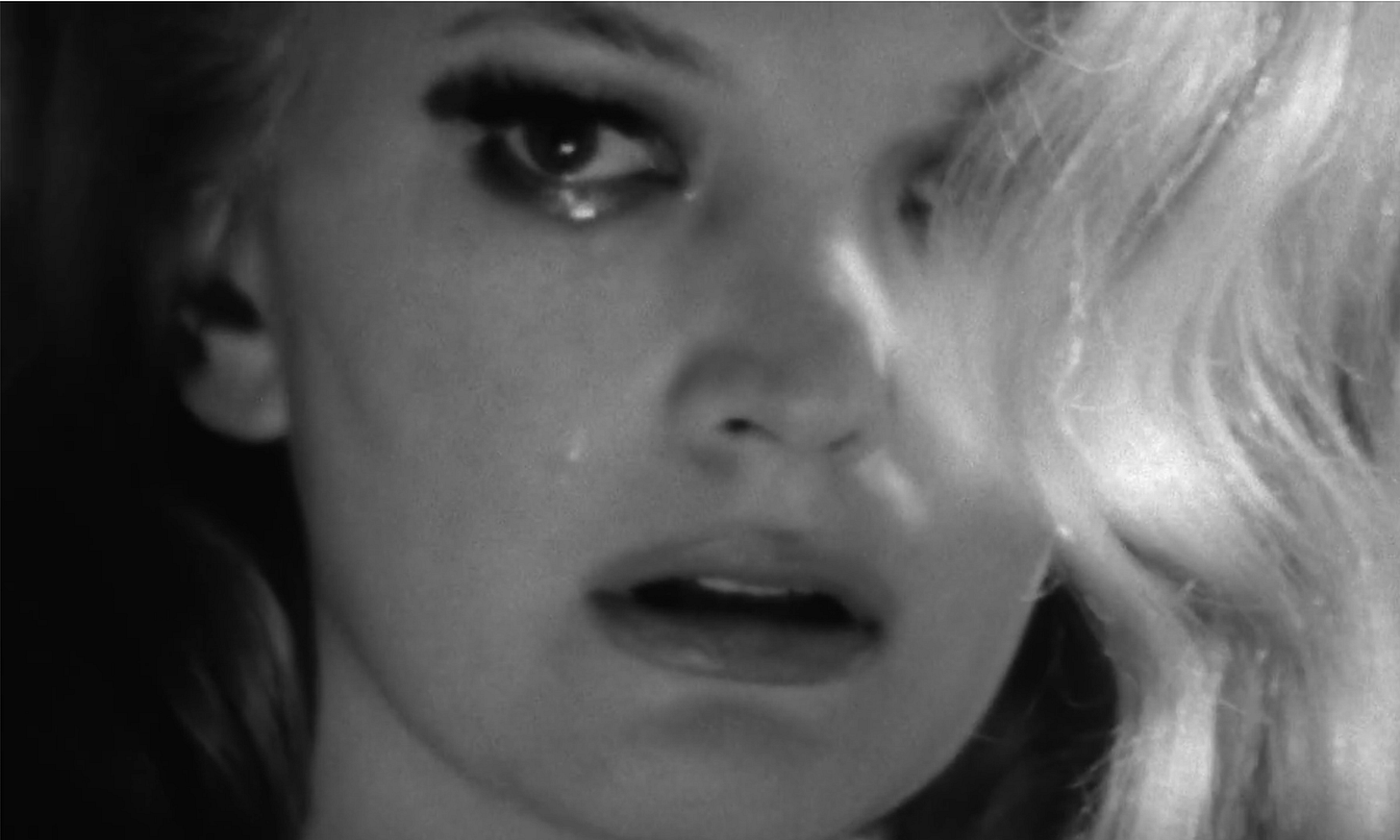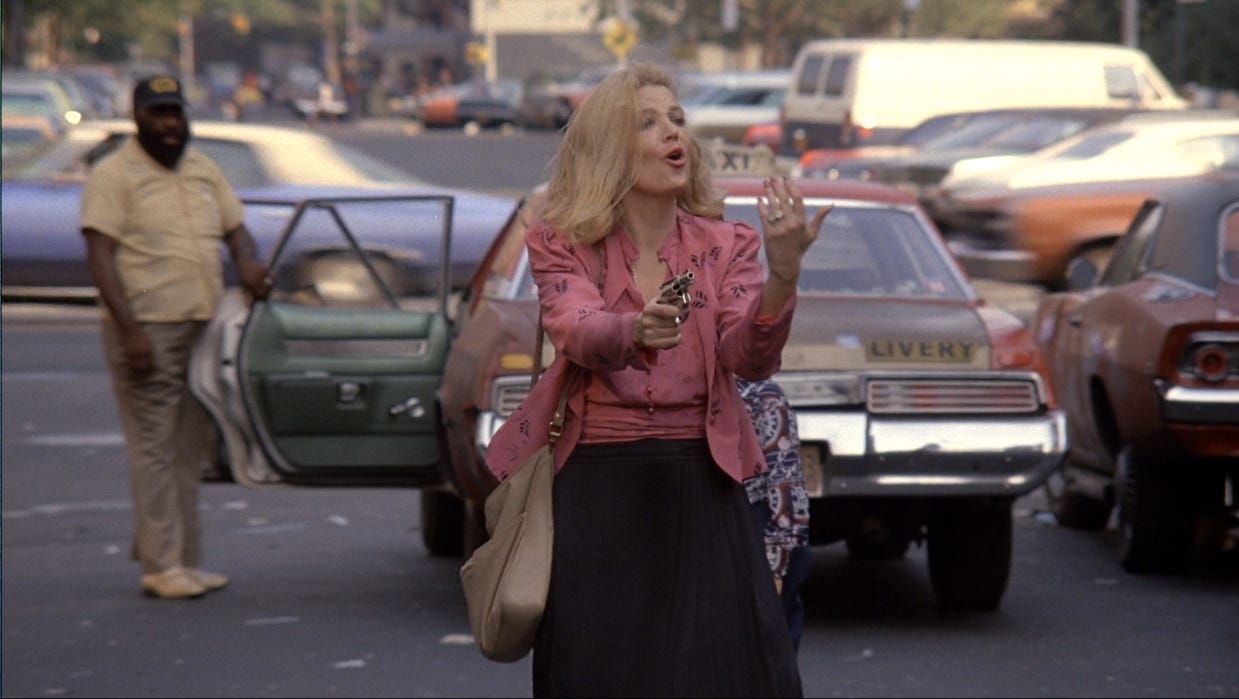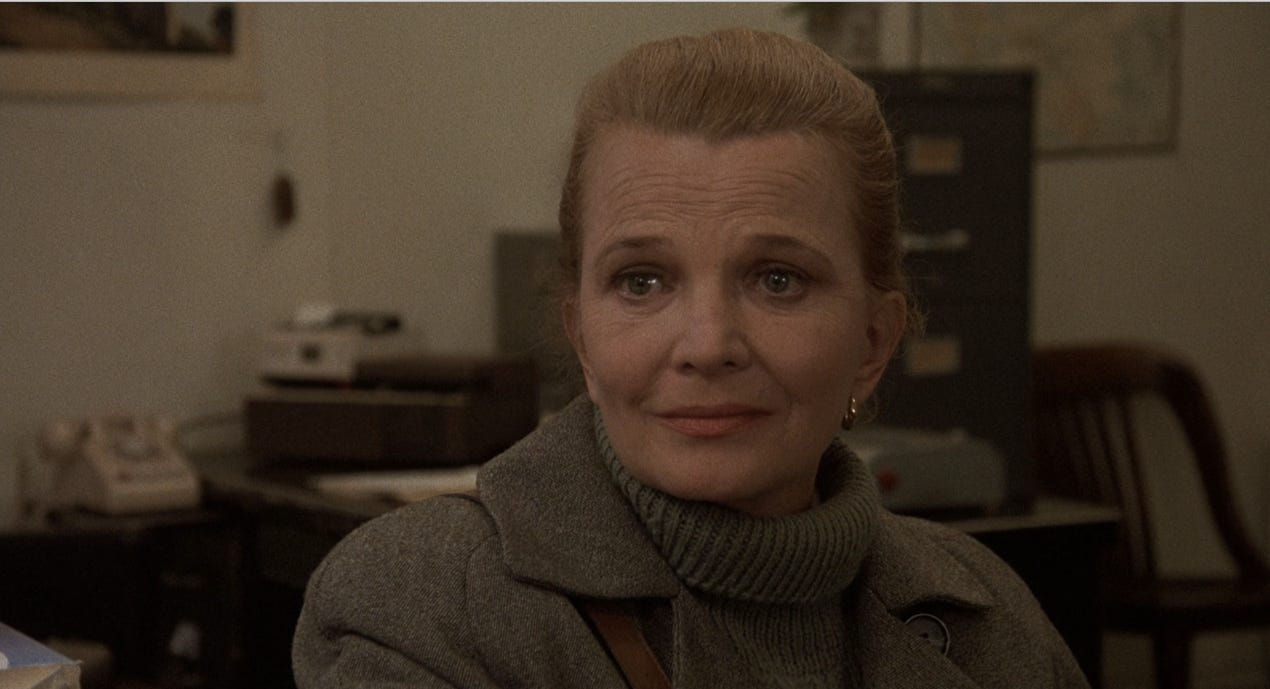Can you hear the sound of her voice? She didn’t sound like anyone else. Gena Rowlands would emphasize words and syllables in words that no one else would have; she heard a music in them all her own, and it was a music that likely came from her 1930s childhood, when wisecracking dames ruled the movies. In interviews, Rowlands always insisted that she had lucked into a happy childhood and that her parents were like Nick and Nora Charles. For her public image, she wanted only happy memories recounted. But in her art, she explored states of mind related to loss of identity that no other actor has ever touched.
In her early work on television, and in movies like The High Cost of Loving (1958) and Lonely Are the Brave (1962), Rowlands has a distinctive, nearly haughty presence, but there is something held back about her work, mainly because of the limited roles she was given to play, like the sexy deaf-mute wife of a cop on the TV show 87th Precinct (1961-62). There were quirks and little disruptions already in her manner, and they came a bit to the fore in the first film she made with her husband John Cassavetes, A Child Is Waiting (1963), where she plays the mother of a handicapped child.
At 33 in A Child Is Waiting, Rowlands is young and pretty, a cool blonde, seemingly, but there is something unstable about her, and an animal-like look of questioning in her wide-set eyes. She has one strong scene with Judy Garland where her character explains her situation in life and the strength she needed to stay with her child, but the conventional writing holds her back from fully conveying what she’s trying to do.
She is riveting and very beautiful in her recurring role on the nighttime soap opera Peyton Place in 1967, but the poor writing and convoluted plotting meant that she was treading water only and reduced to signaling what she might do. Through her twenties and most of her thirties, Rowlands was not allowed to express the fullness of her talent. What is most notable about her 1960s TV work is just how sexist so many of the scripts are that she was given; time and again Rowlands is asked to conform to the most insulting notions about who women are and what they should want.
Her breakthrough would come at age 38 when she played in Cassavetes’s Faces (1968) as Jeannie Rapp, a good-time girl entertaining some gentleman friends. Rowlands looks straight into the camera sometimes here, and her Jeannie is fierce and then amused and then impatient, coasting along these feelings as she drinks more and more alcohol. The unusual sideways quality of Rowlands’s unmistakable voice comes out for the first time, the bottom-of-the-glass, one-of-the-boys emphasis she has, with special relish on words like “terrific,” which she stretches out, landing hard and joyfully on the second syllable.
Jeannie is 28 but pretends to be 23, and of course Rowlands herself is older than that and pushing 40. “I’m too old to be lovely,” Jeannie tells Richard (John Marley). “And I haven’t got a heart of gold.” Jeannie is a real, faceted person, and always changing before our eyes. Rowlands is very precise with her transitions in Faces, and the film desperately needs her precision, for a Cassavetes movie is always threatening to collapse into formlessness. That’s the lure of his cinema, and the excitement, and the tedium, sometimes, and the obscurity.
Rowlands’s Jeannie lives on the edge: on the edge of boredom, on the edge of despair, on the edge of her own sanity even. So many of her reactions in Faces are unexpected, her face sometimes registering a private sort of amusement behind her Veronica Lake curtain of blonde hair.
“You learn how to be feminine,” Rowlands says in her third film with Cassavetes, Minnie and Moskowitz (1971), where she plays prim Minnie Moore, a watcher of movies on the Late Late Show who complains that she never met a Humphrey Bogart or a Charles Boyer. Rowlands can be very masculine on screen, and Cassavetes allows her to be, watching her carefully and bringing out all her oddities and specialness, even the scary, unaccountable things inside of her.
It’s clear in Minnie and Moskowitz, when Rowlands has passed 40, that she’s a beautiful blonde with the soul of a Bowery bum. She’s always pulling faces so that her nose wrinkles and her forehead wrinkles...everything about her wrinkles and grimaces, and she loves to mix emotions: toughness and vulnerability together, or anger and goofiness. Her eyes look so widely spaced here that in profile she often works with just one eye, and one eye is enough. A kind of agitated human carnival, low-down but high-handed, Rowlands has everything Cassavetes needs and everything that her earlier Hollywood parts had never needed or welcomed.
In 1974, Rowlands took on her signature role for Cassavetes, or at least her most demanding dare from him: Mabel Longhetti, a housewife and mother on the edge in A Woman Under the Influence. This is a film that pushes Rowlands to the limits of sanity, and some in the Cassavetes troupe worried that he was pushing her too far.
Mabel nervously loves too much, feels too much, and has no sense of proportion. A kind of thwarted mad genius adrift in domestic life, smoking Virginia Slims in her baby doll dresses and pink socks, she is an alien presence in her blue-collar milieu, all in pieces that no longer fit. “Tell me what you want me to be,” she desperately says to her husband Nick (Peter Falk), a crass guy who loves her madly and maybe has a screw or two loose himself.
The unpredictability of Jeannie in Faces has given way in Mabel to a woman whose reactions make no logical sense. She wants people to “loosen up,” but she’s so loose and so unfettered that she’s floating away. Mabel makes weird and embarrassing faces all the time and talks to herself, twitching and grimacing to her own musical score, and Rowlands plays the film out on a limb and then takes a plunge into behavioral chaos.
When Mabel is finally threatened with being committed to an insane asylum, Rowlands’s eyes roll up into her head, as if she is erasing herself, or maybe looking up to God for help, Lillian Gish-style. (There is a cross on the wall of the Longhetti home, and Mabel makes a cross in front of her with her fingers when a doctor wants to sedate her.) This is the kind of acting that is so deeply imagined that it makes sense that the others on the set were worried about Rowlands’s own sanity. When Mabel cries, “I don’t want anything, just let me stay in my house, please!” to Nick, Rowlands hits a very deep level of abjection.
Nick’s mother yells that Mabel, who used to be Mabel Mortensen before Nick got her pregnant and married her, is “empty inside,” and that’s one way of looking at it. It also might be said that Mabel is so exposed and so helplessly aware of things that most people have learned to ignore that her fear and insecurity has both a feminist and an existential validity. Mabel is incapable of social distancing or lying to herself, and she yearns for a utopia where she is a good or better mother to her three children, and also a kind of artist in her backyard, a dancer (she always wants to dance and to get people to dance). You could rightly say that Mabel is oppressed, yet being a wife and mother is one of the few things that grounds her in life at all.
When Mabel comes back from the asylum, she is mortified and painfully demoralized, but just as socially inappropriate as ever. Nick tries to hold her together, but it seems to be no use. “Dad, will you stand up for me?” Mabel asks her father, the line that James Dean made famous in Rebel Without a Cause (1955). Mabel is a borderline outcast like Dean is, but she has precious little of his glamour or authority.
Unable to handle the pressures of her life any longer, Mabel tries to cut her wrists, and this lowest possible moment acts as a mysterious catharsis in A Woman Under the Influence, at least momentarily. “You know, I’m really nuts,” she tells Nick, wonderingly, after they have put their three children to bed. “I don’t even know how this whole thing got started.” The trauma of the innocent Mabel Longhetti is seen, miraculously, as a sort of show that has ended, for now.
Cassavetes and Rowlands mortgaged their house to finish A Woman Under the Influence, and when no distributor was interested they basically distributed it themselves, taking it to small theaters and college campuses and introducing it. This film won Rowlands an Oscar nomination for best actress, but Ellen Burstyn took that Oscar for Alice Doesn’t Live Here Anymore, a film that is as explicitly feminist as Woman is implicitly so. “That’s an Academy Award-winning part,” Burstyn said of Rowlands’s Mabel years later in a documentary. “Just not my award.”
The sense of searching in her acting and pushing out into new frontiers is even more pronounced in Rowlands’s fifth film with Cassavetes, Opening Night (1978). In that movie she is Myrtle Gordon, an alcoholic theater actress of a certain age struggling to find reality in a second-rate play about aging. Myrtle seems to be a Lee Strasberg Method-based mess, following any emotional whim but sometimes sneering at herself in a mirror.
Rowlands’s Myrtle is childlike and ruthless and nearly comically self-absorbed. As a young actress her emotions were close to the surface, but now she struggles to find them, and she is willing to do anything to get to that level again. Like Mabel Longhetti, Myrtle Gordon is admirable on one level and a pain in the neck on another. And also like Mabel, Myrtle has lost touch with reality, yet she is aware on a deeper level of human futility in the face of impending death, and that is death for her as an actress. Nick deeply loves Mabel in A Woman Under the Influence, but no one loves Myrtle except her public, and she needs to hang on to that love. This is the main reason that Myrtle turns the sad play she is starring in, The Second Woman, into an audience-pandering comedy by improvising most of the last act.
Cassavetes isn’t much interested in backstory or characterization but in the crisis he is filming in the lives of his people right now, so that we have to fill in a considerable number of blanks here. The Cassavetes-Rowlands movies are open-ended and amorphous works that can be interpreted any number of ways, and the sense of reality in them is always shifty. These are pictures that are dependent entirely on Rowlands’s emotional intuitiveness, which Cassavetes makes radical demands on.
Upset by the death of a young fan outside the theater one night, Myrtle tries anything to re-engage with the play she’s in: retreat from others, desperately people-pleasing improvisation, self-abuse. And somehow the worse she looks the more glamorous Rowlands seems here. This actress Myrtle has an outlet for all her nonsense whereas the housewife Mabel in A Woman Under the Influence does not, and Opening Night makes that, at least, very clear.
Cassavetes seems to be on Myrtle’s side, but he also details the hell she puts everyone around her through. Like Kim Stanley, the ultimate self-destructive Method actress, Rowlands’s Myrtle will do anything to make her acting “real,” and that reality finally comes to her, it would seem, through the consumption of an excessive amount of alcohol. This is an extreme view of what it can take to be a great actor, but Opening Night is also about what the tyranny of a star in the theater can do.
Rowlands was at her very best in this period in two movies for TV, A Question of Love (1978), where she played a lesbian mother fighting to keep custody of her children, and Strangers: The Story of a Mother and Daughter (1979), where she went inch-for-inch with the formidable Bette Davis. When her son denounces her in court in A Question of Love, Rowlands’s animal-like pain is so deeply felt and expressed that it feels like we shouldn’t be watching it.
Rowlands brought a new power and held-back simplicity to her scenes with Davis in Strangers, letting the older actress star shine more brightly by tactfully counterpunching until the final scene, where she lays out the whole of her character’s life with such end-of-the-line grace that she is very moving, even more so than in the pyrotechnics of the Cassavetes films.
Cassavetes created an old-fashioned kind of vehicle for her in Gloria (1980), a more commercial film with all the gritty underpinnings of the New York of that period. It’s a movie that works in spite of its clumsiness and not because of it, as in other Cassavetes films, and it runs on Rowlands’s near-lunatic nerve. As an aging former gun moll who protects a little kid from the mob, Rowlands is so believably tough that we do not question all the tight squeezes she pulls the kid out of.
A kind of wacky blonde Clint Eastwood, Gloria is a little crazy, too, crying, “C’mon, c’mon, ah, I’d love it, c’mon, don’t hang back!” when she has nearly gotten away from the men who have been pursuing her. “Sissies!” she taunts, holding a gun, her hair in her eyes. “Ya let a woman beat ya, huh? You little tiny nothing!” In a situation that would frighten and intimidate just about anyone else of either sex, Rowlands’s slightly cracked Gloria mainly enjoys herself.
Four years later, there was a seventh and final film for Cassavetes called Love Streams where Rowlands played his sister, a woman who memorably brings home most of the animals from a petting zoo because she thought it was a good idea at the time. Rowlands’s work for Cassavetes is always in the spirit of James Dean’s Jim Stark in Rebel Without a Cause, and other Nicholas Ray romantics. Her films with Cassavetes are odes to misfits with new ideas and ways of doing things, women and men who are almost not crazy.
A few years later for Woody Allen, Rowlands was the repressed philosophy professor Marion Post in Another Woman (1988), a modest film where she gave a totally different kind of performance: disciplined, realistic, un-showy, full of tightly-reined-in feeling. Cassavetes died in 1989. After that, alas, it was back to the kinds of conventional parts in which Rowlands had labored in her twenties and thirties.
For her son Nick Cassavetes, Rowlands revived her haughty dame routine for Unhook the Stars (1996), and she tentatively sang in Terence Davies’s The Neon Bible (1995). At age 84, Rowlands was still wrinkling her nose and acting snooty in Six Dance Lessons in Six Weeks (2014), where she plays a 75-year-old pretending to be 68 who says, “If you say your real age out loud, your face hears you.” She was given an honorary Oscar in 2015.
In her later career, Rowlands generally played mothers and then grandmothers, and nearly all of them were alive with her vibrant there-ness, that thick blonde hair, her crooked grin, her sheer bonhomie. If she had never met Cassavetes, maybe we would never have known about what was underneath all that.
She lived a long time past Cassavetes, and in the last years of her life she had Alzheimer’s disease, so identity was lost to her at the end, and this is so much what her greatest work was about. Their creator is gone now, but Mabel Longhetti and Myrtle Gordon are always lying in wait, on DVD, in dark repertory cinemas, on streaming (love streaming), forever asking their hard and probably impossible questions.
PS: Sheila O’Malley wrote the script for the film clips shown when Rowlands was given her special Oscar, and she loves and understands Rowlands and her work better than any other writer. Here is a video O’Malley did on Rowlands for Criterion in 2014.
Here’s a 1968 episode of a TV show called Garrison’s Gorillas in which Rowlands gets to play around with her Marlene Dietrich-leanings, with glamorous new outfits for different scenes.
And here is Strangers: The Story of a Mother and Daughter (1979), her TV movie with Bette Davis, to my mind her best work outside of her films with Cassavetes.
(This piece is adapted from a chapter in my book The Art of American Screen Acting: 1960 to Today)











Beautiful, heartfelt tribute! Bravo Gena; Bravo Dan Callahan!